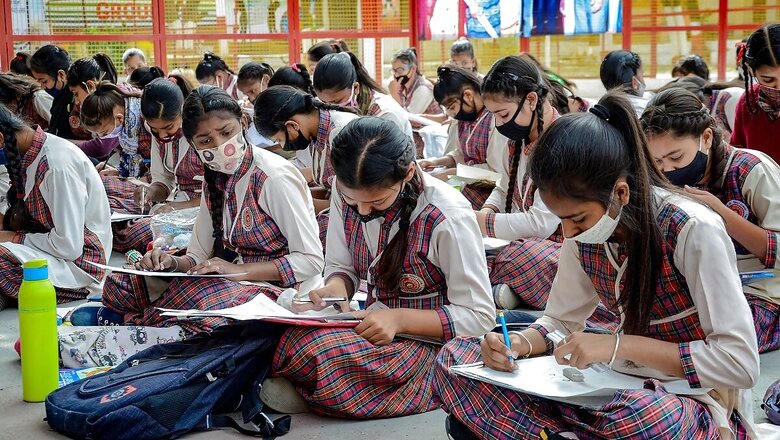
views
The Delhi High Court Monday refused to stay its single-judge order allowing private unaided schools to collect annual and development charges from students for the period after the lockdown ended in the national capital last year, saying if the AAP government was so populist, it can help schools with some funds. A vacation bench of Justices Rekha Palli and Amit Bansal issued notice and sought response of the Action Committee – Unaided Recognised Private Schools, which represents over 450 schools, on the appeals of AAP government, students and an NGO challenging the single judge’s May 31 order.
We are rejecting the stay application, the court said, adding that a detailed order containing reasons will be made available later on. It listed the appeals before the roster bench on July 12. Don’t be just a populist government. Give money to schools also. They also need money to run the schools. They have to pay taxes also, the bench said.
Later in the hearing, the court again said, If you want to be such a populist government, please help them. Do something, who is stopping you. The court recorded the statement made by the senior advocate Shyam Divan, representing the action committee, that till the next date of hearing, they will continue to follow the existing principles in relation to collection of fees from students.
The Delhi government and the students and NGO, ’Justice for All’ have contended that the single judge’s decision was based on incorrect facts and law. The May 31 verdict had quashed two office orders of April and August last year issued by the Directorate of Education (DoE) of the Delhi government forbidding and postponing collection of annual charges and development fees, saying they were ”illegal” and ”ultra vires” the powers of DoE stipulated under the Delhi School Education (DSE) Act and the Rules.
Senior advocate Vikas Singh and standing counsel Santosh Kumar Tripathi, representing Delhi government, argued that the single judge gravely erred in passing the directions on the basis of a Supreme Court order relating to collection of school fees. Singh said the order overlooked the fact the Supreme Court judgment pertained to Rajasthan and imposition of tuition fee was for a time when schools had physically reopened there, which is not the case in Delhi.
He further said as per the schools affidavit itself, 60 per cent of tuition fees were sufficient for discharging their liabilities towards teachers’ salaries and the remaining amount could take care of other expenditure including development charges. Delhi government also contended that the single-judge order failed to appreciate the powers of Department of Education to pass such an order.
The Delhi government’s counsel contended that the single judge’s order was erroneous and prayed for staying the operation of the verdict. The stay application was opposed by senior advocate Shyam Divan and lawyer Kamal Gupta, representing the association of private schools, who argued that the Delhi government had no power to interdict private contracts between schools and students’ parents.
The counsel said the single judge had rightly ruled that there was no allegation of schools indulging in profiteering in this case and in the absence of such allegation, there could be no interference by the Delhi government. Advocates Khagesh Jha and Shikha Sharma Bagga, representing NGO Justice for All and various parents, the private schools were asking for paying charges for something which is not being provided to the students and the schools have started harassing the parents by asking to deposit money.
The single judge, in the May 31 order had said the Delhi government has no power to indefinitely postpone collection of annual charges and development fees by private unaided schools as it would unreasonably restrict their functioning. The Delhi government has contended that its orders of April and August last year were issued in larger public interest as due to the COVID-19 lockdown people were in financial crisis.
The DoE has contended that ”charging fees is not the only source of augmenting the income” and any observation to the contrary will not only be prejudicial to the interest of the private unaided schools, but it will be difficult to regulate them. The DoE has said schools, if unregulated, will determine their own fee structure ”as per their whims and fancies” and it was duty bound to not allow any other head of fees other than those necessary to be charged as ’fees’.
The appeals on behalf of the students have claimed that establishment costs, like repairing of buildings, administrative expenses, rent and hostel expenses, are not applicable when the schools are closed. They have also contended that the charging of annual and development fees was only deferred and not stopped and the schools could have charged the same once the pandemic situation normalised.
The pleas on behalf of the students and that filed by DoE have also contended that the conditions imposed by the Supreme Court on Indian School, Jodhpur vs State of Rajasthan, could not have been made applicable to Delhi, as the education laws in both states are different. The single-judge verdict, passed on the plea by the action committee, said that schools shall collect annual fees with a deduction of 15 per cent as allowed by the apex court in the Indian School case.
It also said the amount payable by the students have to be paid in six monthly installments from June 10.
Read all the Latest News, Breaking News and Coronavirus News here.




















Comments
0 comment